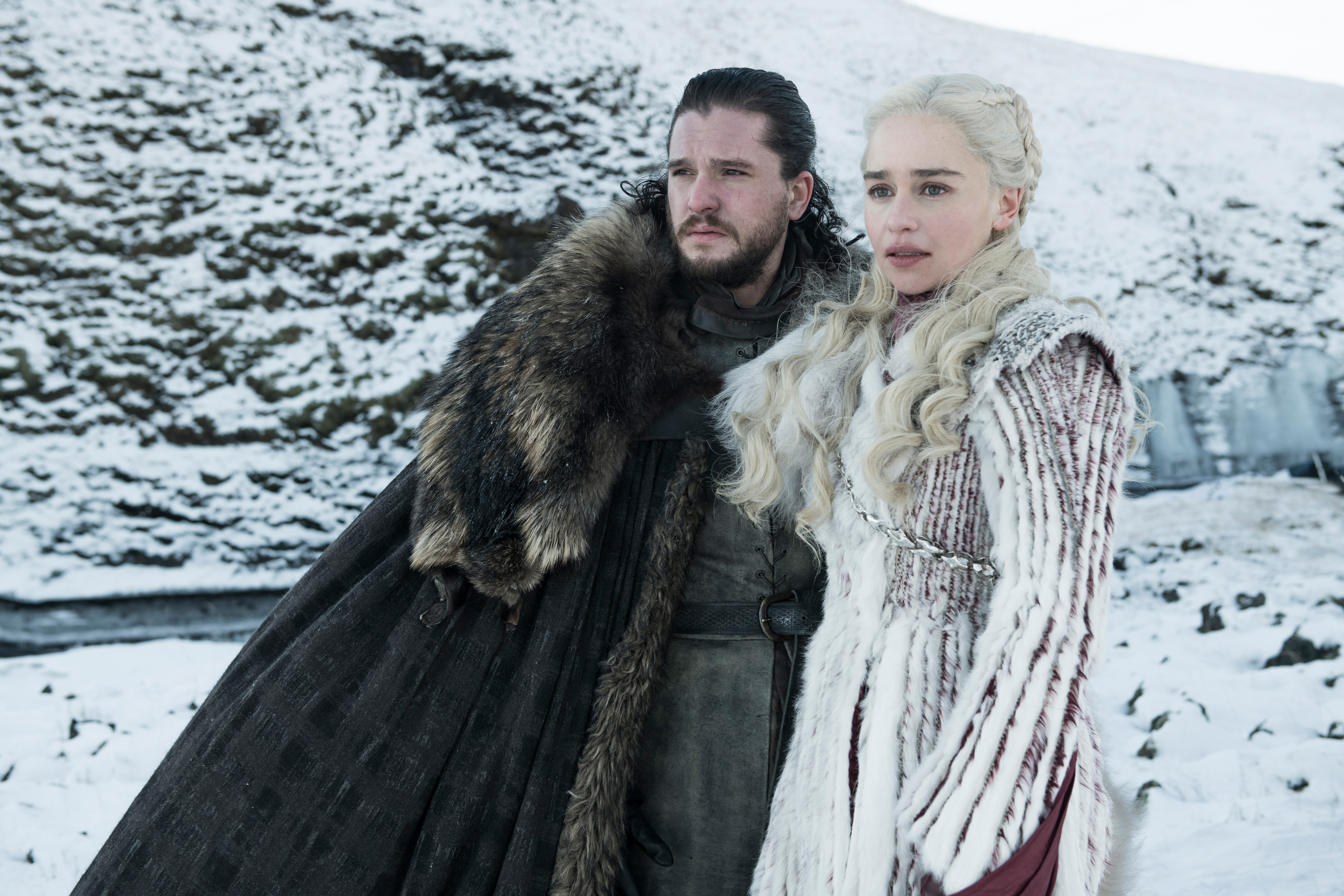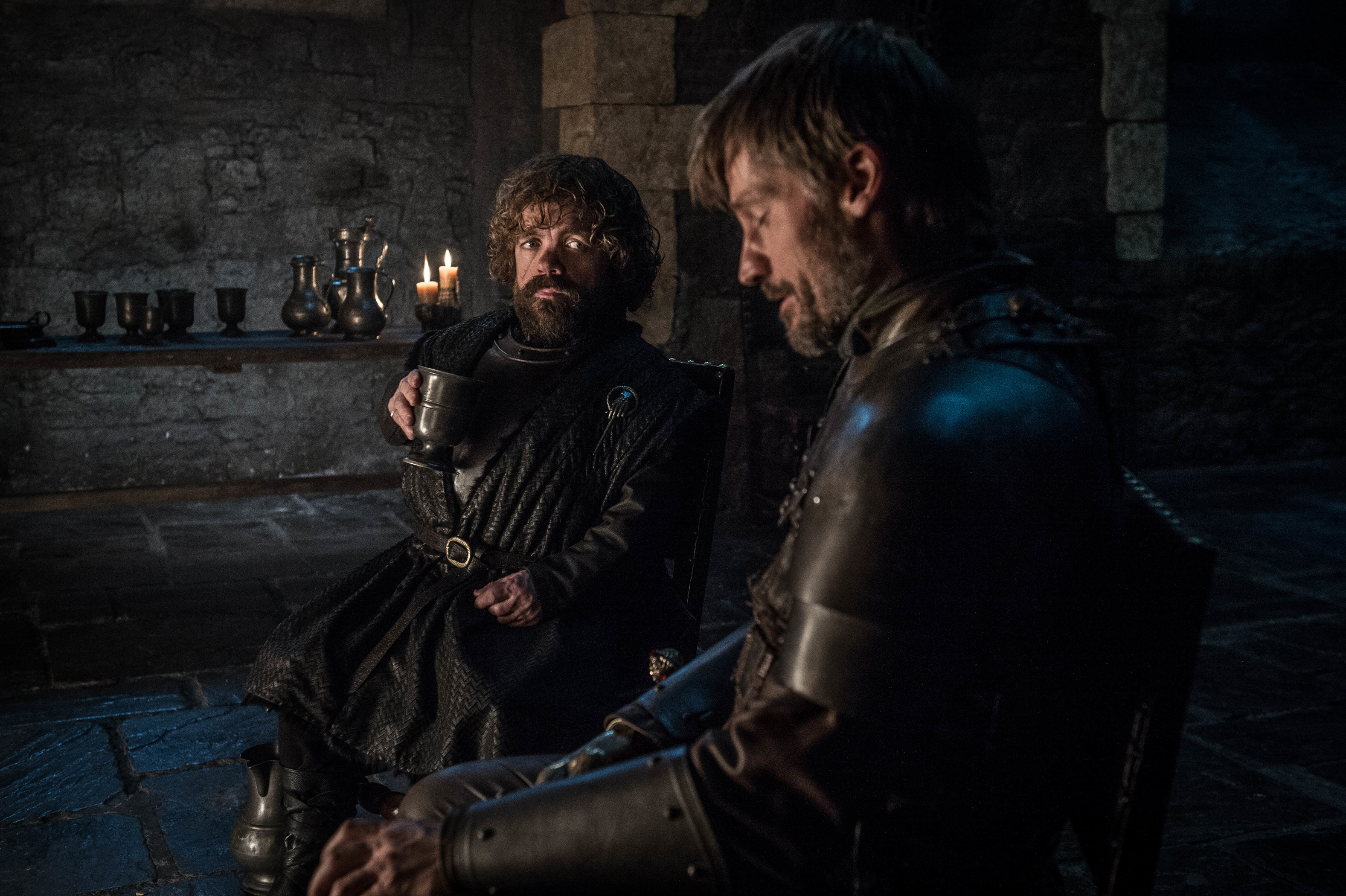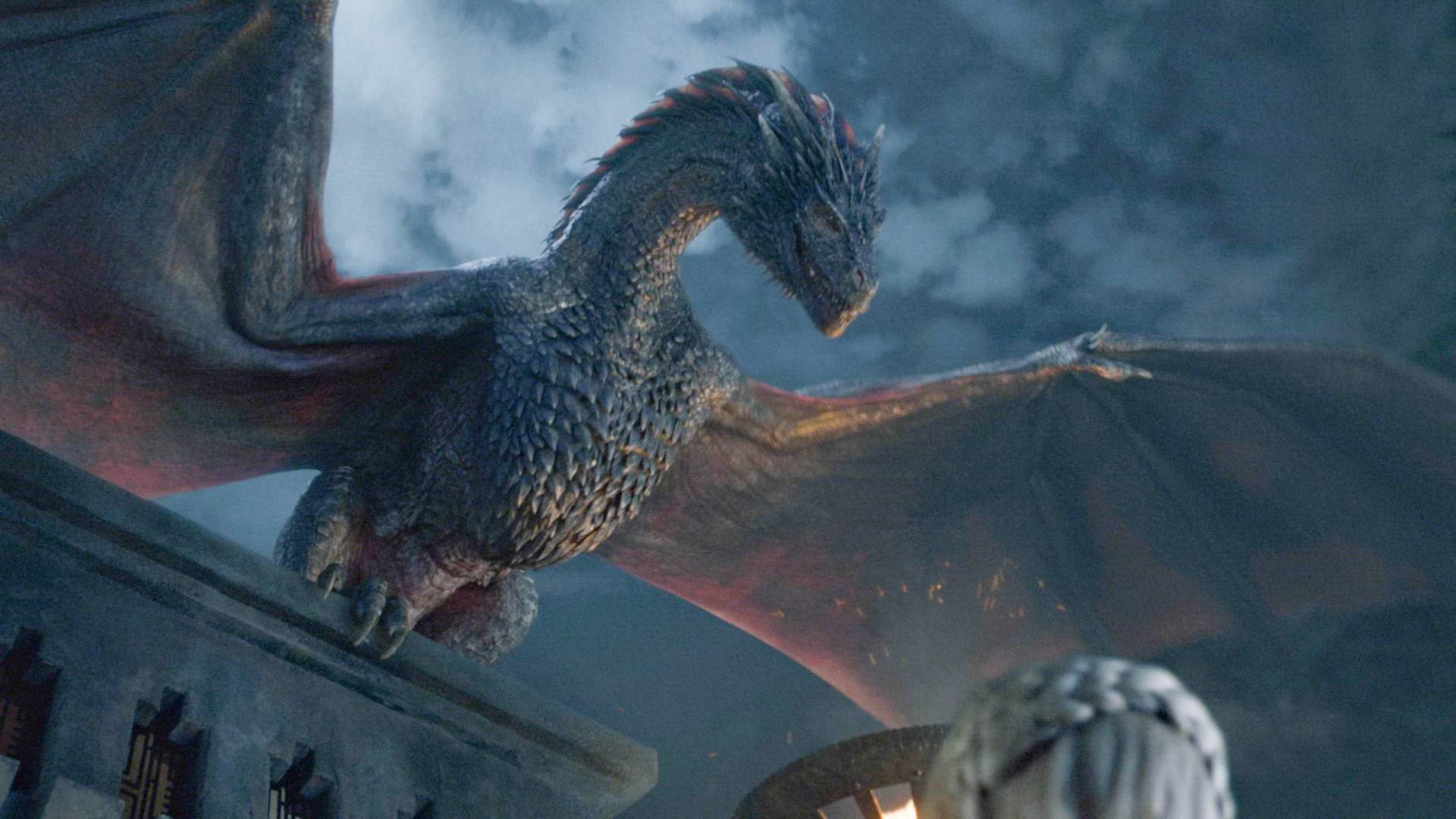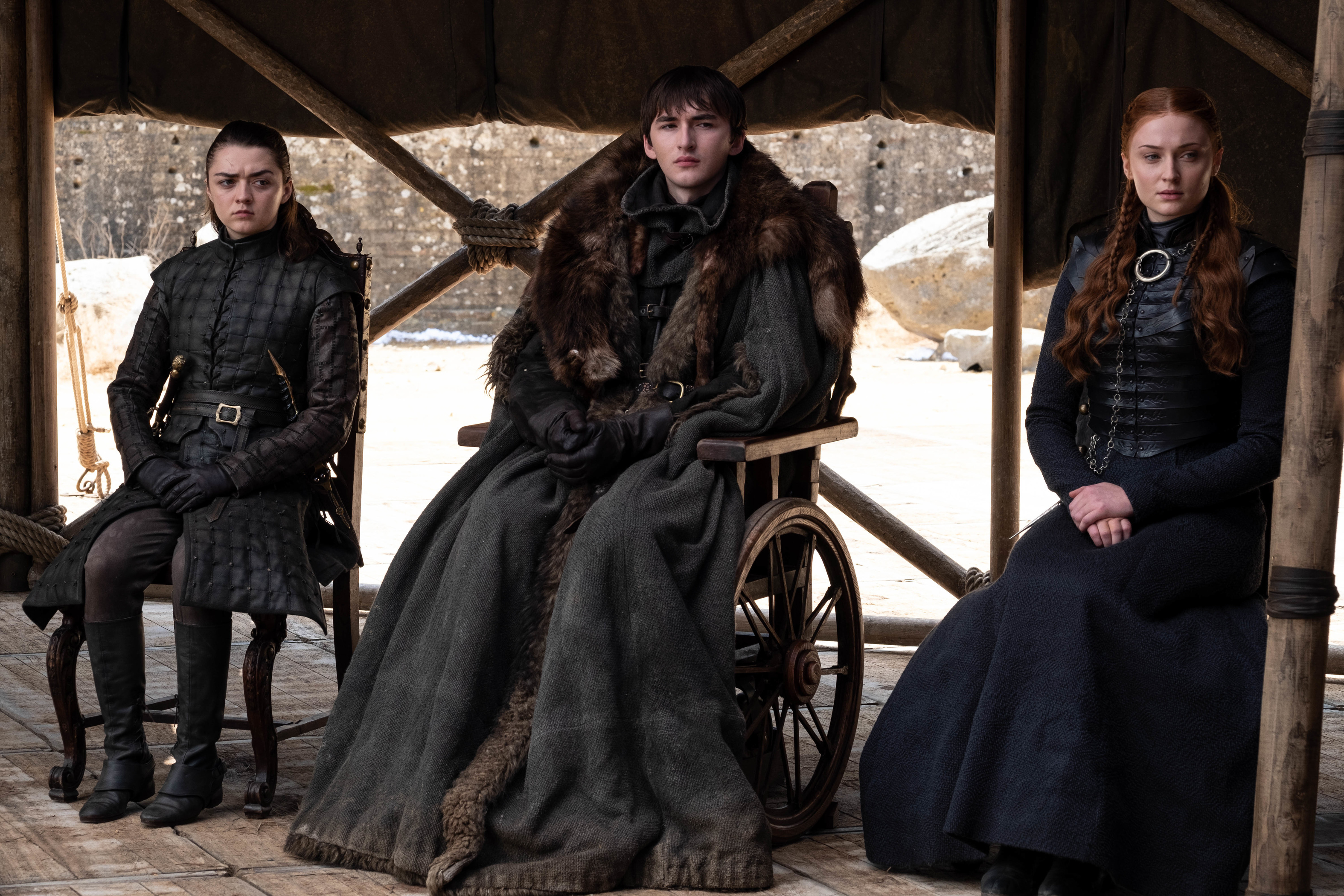A great meme often visualizes a sudden status change: Alonzo Mourning’s benchside anxiety, then relief. Drake shooing away one idea, only to find a more agreeable alternative. There’s a reveal or a reaction. And the greater the tension involved, the more expressive the meme. So when it comes to the legacy of Game of Thrones’ final season—maybe the only season of a beloved show that earned near-universal consensus among all of its disparate fan factions as “not good”—we might not have gotten everything we wanted, but we will always have the memes, which, as the series careened to its muddled conclusion, came to represent more than jokes.
Whether it was Bran’s blank stare from “Winterfell,” or Daenerys’ dismissive smirk, the Game of Thrones showrunners stuffed season 8 with images we could project our social media personas onto. How deliberate that was is anyone’s guess. But David Benioff’s admission that “Dany sort of forgot about the Iron Fleet”—a meme in its own right—took on a symbolic importance, as more and more plot shortcuts emerged in the show. Time and time again, the destination failed to justify the journey; sometimes, Benioff and Weiss just skipped the journey altogether. Jaime Lannister, whose seven-season-long character development from cartoon villain to multifaceted antihero was perhaps the show’s finest, reversed his entire redemption in just a couple of hours. Brienne of Tarth, who worked endlessly to demonstrate her knightly merit, was quickly undone by a broken heart. The entire threat of the White Walkers, a pillar of the series, was erased in one tidy, barely deadly battle.
 Frustration mounted. Speculation about which beloved character would die next escalated with each increasingly puzzling episode. Consciously and subconsciously, viewers began to recognize that their questions and theories couldn’t all be addressed on such a condensed timeline. Fans beamed much of their negative energy toward showrunners D.B. Weiss and David Benioff, two veteran Hollywood writers who made themselves more prominent over the course of the series thanks to their recurring “Behind the Episode” featurette. Much of that ire is deserved. Ending the show in two brief seasons, with each increasingly puzzling episode heightening the anxious speculation over which beloved character would die next, was their idea, not HBO’s. A feeling of being burned out seemed to plague the entire production, and some of the show’s most celebrated actors alluded to the resentment they felt about their characters’ development during major press events. When news circulated that Weiss and Benioff had landed the next major Star Wars project, due in the near future, the reason for the rush job became much clearer.
Frustration mounted. Speculation about which beloved character would die next escalated with each increasingly puzzling episode. Consciously and subconsciously, viewers began to recognize that their questions and theories couldn’t all be addressed on such a condensed timeline. Fans beamed much of their negative energy toward showrunners D.B. Weiss and David Benioff, two veteran Hollywood writers who made themselves more prominent over the course of the series thanks to their recurring “Behind the Episode” featurette. Much of that ire is deserved. Ending the show in two brief seasons, with each increasingly puzzling episode heightening the anxious speculation over which beloved character would die next, was their idea, not HBO’s. A feeling of being burned out seemed to plague the entire production, and some of the show’s most celebrated actors alluded to the resentment they felt about their characters’ development during major press events. When news circulated that Weiss and Benioff had landed the next major Star Wars project, due in the near future, the reason for the rush job became much clearer.
That Weiss and Benioff might currently seek a hyper-lucrative global deal is no coincidence of timing. Game of Thrones concluded Sunday night on air, but those dudes had already moved on, mentally, a while ago. However, the D&D opened a portal to a compelling conversation. Never since The Sopranos have television characters’ arcs been so thoroughly examined and scrutinized, not only in obsessive, antagonistic fanboy corners of Reddit, but at length in the pages of the paper of record. It seems likely that Game of Thrones‘ highs and lows will continue to be studied for a long time.

Also Read
Anthony Carrigan Loves Surprises
For writers and creative types, an exciting conversation is playing out: people value good writing, and there’s like, a trillion shows being made! Someone needs to write those shows. More fantasy is in demand, both in the extended GoT universe and otherwise. But, also this: Game of Thrones is based on a celebrated series filled with complex characters, and even with the book’s author producing the show, it couldn’t stick the landing. To watch as they ran out of source material in real time was an increasingly surreal experience. Anything that occurred after A Dance of Dragons ended scanned as an unsatisfying form of metafiction—in particular, in both scenes where dragons were sacrificed (Viserion in Season 7’s “Beyond the Wall” and Rhaegal in Season 8’s “Last of the Starks”) for battle parity.
So why did we come all of this way? I’d argue: both for a sweeping resolution and the Lasting Existential Comment we were promised. We got neither, and virtually everyone is mad about it. So what happened?
***
While watching the show over the past eight years, I interacted with three principal texts: the show itself, the books, and Reddit’s ravenous Game of Thrones community. While Martin’s books are far from perfect, and contain plenty of characters and contraptions I’m glad were not integrated into the show—Lady Stoneheart, the other Aegon Targaryen, Euron Greyjoy’s MAGIC DRAGON BINDING HORN—Martin flipped fantasy tropes in a compelling way. The books cleverly subverted familiar archetypes, positioning Robert Baratheon’s surprising defeat of Rhaegar Targaryen at the Trident as a cosmic accident, one that turned the world on its axis. In the aftermath of a regime change, all of Westeros’ families—as well as opportunists like the shark-like Littlefinger and the more well-meaning Ser Jorah Mormont—had something to gain.
Even before the mic drop of Ned Stark’s execution at the end of A Game of Thrones, Martin planted the idea that power is random and that virtue can be a downfall. While a character flaw could stifle a bid for the Iron Throne before it really began, some flaws, like Dany’s predilection for violence, accelerated their campaigns. Martin’s allusions to World War II, Ancient Rome and even the Grateful Dead made for a fascinating universe that exuded an offbeat and unusual energy. It found an audience immediately. You really weren’t sure who was going to end up on that throne (which looks way sweeter in the mind’s eye of the books, by the way). The fact that the narrative threads appeared to be hurtling toward a thrilling and unpredictable collision made it all the more exciting. Westeros was worth winning; its politics deserved to be dissected.
 When it was at its finest, the show echoed Martin’s worldview. It successfully captured the books’ relationship to magic and religion and their role in Westeros, and two undefined presences that appeared to have a tangible effect on its characters’ motivations. “Chaos is a ladder” and “Valar morghulis”—translated from Valyrian: “All men must die”—were cryptic maxims many of Martin’s most compelling characters lived by. In his best plots, he pitted fate and free will against each other. For most of its run, the series also did justice to Martin’s narrative style, where each chapter of A Song of Ice and Fire takes place from a single character’s point of view; that’s what made the decision to cut away from Dany’s perspective after she suddenly snaps in “The Bells” such compelling television.
When it was at its finest, the show echoed Martin’s worldview. It successfully captured the books’ relationship to magic and religion and their role in Westeros, and two undefined presences that appeared to have a tangible effect on its characters’ motivations. “Chaos is a ladder” and “Valar morghulis”—translated from Valyrian: “All men must die”—were cryptic maxims many of Martin’s most compelling characters lived by. In his best plots, he pitted fate and free will against each other. For most of its run, the series also did justice to Martin’s narrative style, where each chapter of A Song of Ice and Fire takes place from a single character’s point of view; that’s what made the decision to cut away from Dany’s perspective after she suddenly snaps in “The Bells” such compelling television.
As the series’ principal characters all arrived at the same location—something that has yet to happen in the books—the show’s world got much smaller. The character’s choices suddenly felt less authentic and more transactional. All of the sudden, our heroes were traveling great distances over illogically short periods of time in baldfaced service of the plot. This strategy allowed for additional action but made Martin’s world feel increasingly meager and one-dimensional. While the Night King’s story in the books hasn’t yet unfolded, the Long Night’s shadow provided an important countercurrent in the A Song of Ice and Fire, setting up Martin’s other interesting existential dynamic: the role of writing history, and the possibility of that history’s complete erasure.
Ultimately, the final season of Game of Thrones failed to prove the throne was worth winning in the first place. The Night King was dispatched quickly and anticlimactically. The show broke its rhythm, making its audience unlearn its storytelling style on the fly. Instead of carefully—maybe tediously—establishing characters’ motivations, irreversible changes of heart seemed occurred every ten minutes. R+L=J turned out to mean… almost nothing. The show’s commentary about fate and power, once revelatory and thought-provoking, began to resemble no more than nihilism. Cersei’s death got about as much screen time as Tyrion moving chairs around, a scene that might have resonated in a previous season but felt ridiculous in the context of the show’s recent pacing.
cersei and daenerys when they see each other in hell pic.twitter.com/bi0ZHMcUpa
— ellie (@odairannies) May 20, 2019
While HBO’s Game of Thrones may be remembered for its underwhelming attempt to tie up loose ends—the series finale that literally told its audience to accept compromise even though no one is happy—the show has had a net positive effect: it’s put a premium on rich storytelling in the cultural imagination. Game of Thrones fans are hungry for it, and there are millions of them. In an increasingly visual culture, more fantasy and sci-fi sagas are and will be adapted into television, and Game of Thrones is to blame for that domino effect. The new adaptation of Phillip Pullman’s His Dark Materials looks promising, with an ending that will make Jon Snow’s “bittersweet” banishment feel like a weekend-long house arrest. Also, you know, those prequels. And there will be a lot more.
Aside from its, ahem, controversial ending, Season 8 will be remembered for its technical accomplishments, which—coffee cups and water bottles aside—were inevitably stunning. The three-dragon fight in the clouds, the swell of Daenerys’ theme hitting before Euron spears Rhaegal out of the sky, the on-the-nose but also perfect image of Drogon unfurling as Dany descends the Red Keep stairs—these will remain images seared into our brains. Bryan Cogman’s episode “A Knight of the Seven Kingdoms” was one of the series’ greatest episodes, treating its characters gently (Jaime knighting Brienne) while also delivering emotional send-offs for fans (Theon Greyjoy, Podrick). It was well-weaponized fan service. We can build from this.

So, George—we gotta have those books, man.




